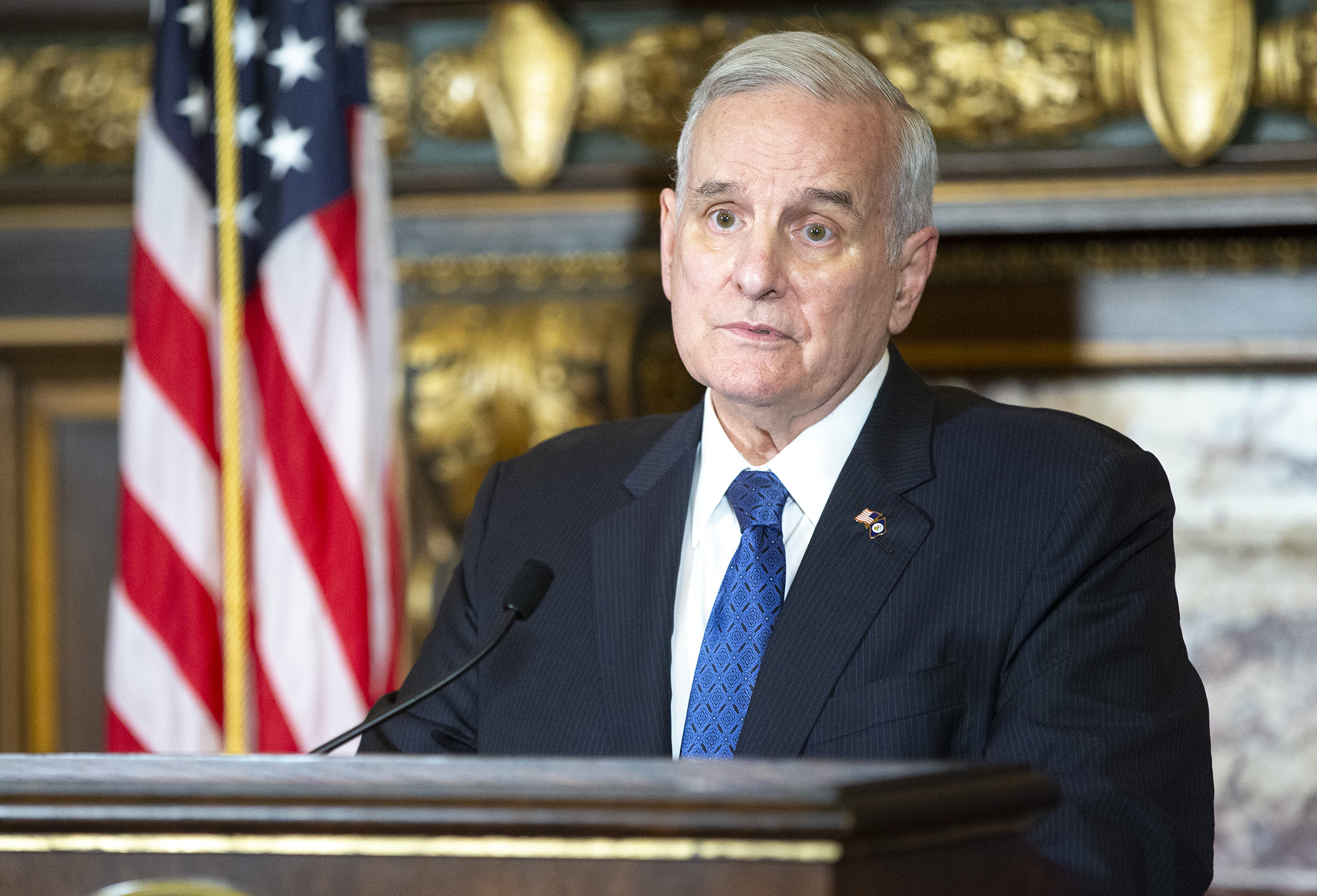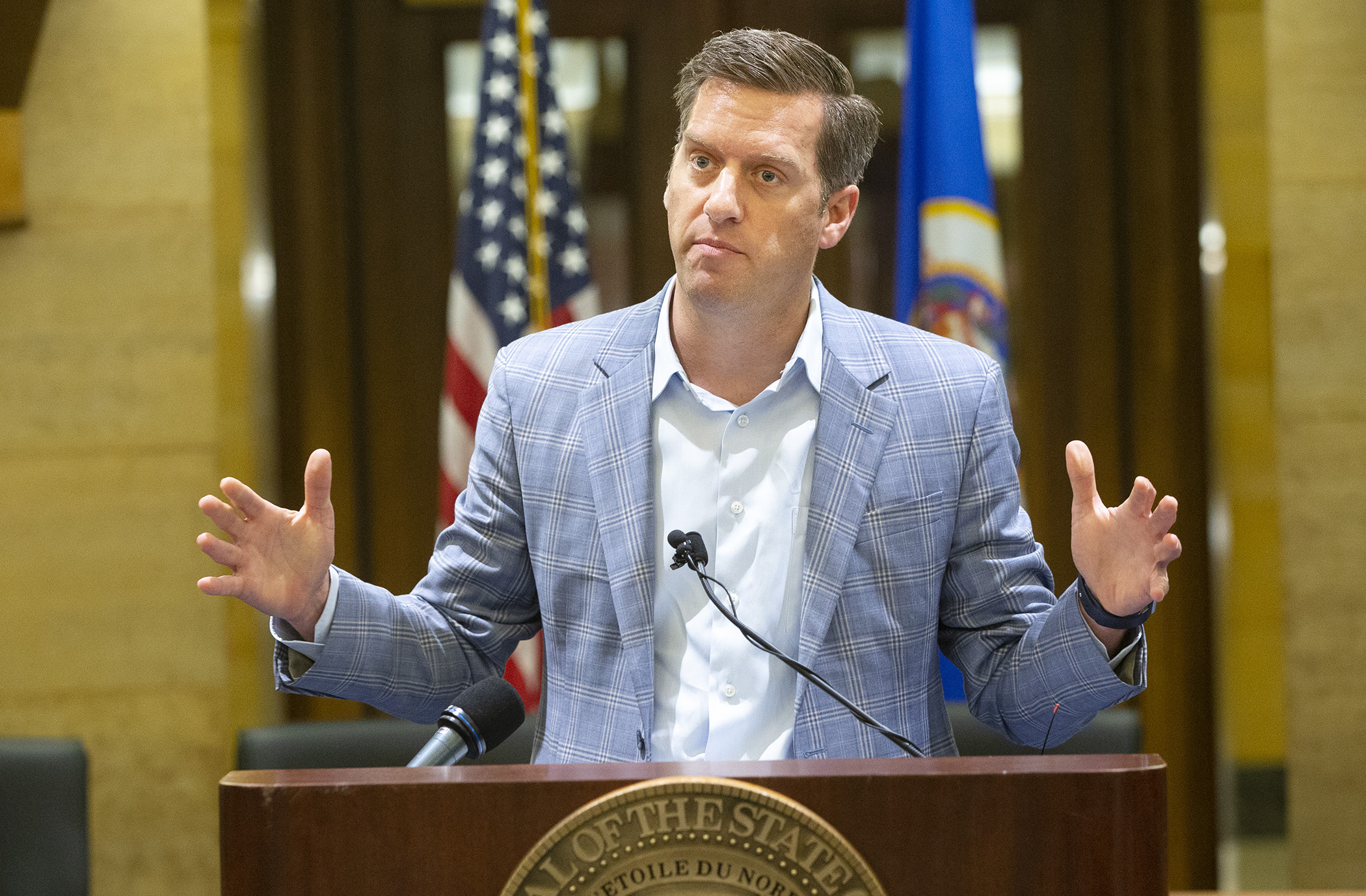Dayton vetoes supplemental budget and tax bills, says no special session

In the days leading up to the end of the 2018 legislative session May 20, Gov. Mark Dayton repeatedly pledged to veto major pieces of legislation that included provisions he would not accept. The governor followed through on those promises Wednesday, vetoing the omnibus supplemental budget bill and the omnibus tax bill.
In a morning press conference announcing his actions, Dayton also held firm on another pledge, saying he would not call the Legislature back to resume negotiations on the failed bills.
“No special session. They had their chance,” Dayton said. “They messed this session up worse than anything I’ve ever seen.”
Dayton said the omnibus supplemental budget bill, HF4099/SF3656*, which contained many of the session’s most significant legislative efforts including measures to combat opioids and elder abuse – and which would have spent millions of dollars on education, health care and transportation – did too little to address problems and was loaded instead with objectionable policy.
The governor said he had been “assured” by legislative leaders they would send him standalone bills to deal with the opioid crisis and address elder care abuses, but they chose instead to combine those issues with policy provisions they knew he would not support, provoking his veto to score political points.
“This session was not about working out agreements with me, it wasn’t even about working [for] the best interests of the people of Minnesota,” Dayton said. “It was about House Republicans cozying up to the special interests, giving them what they wanted … and getting their talking points to go around this state and claim I vetoed some important measures which, unfortunately, we’re part of the bill.”
House Speaker Kurt Daudt (R-Crown) responded later in the day, telling reporters a lot of people will be hurt by the vetoes and that he was “embarrassed for the governor” and “incredibly disappointed” by his actions.
WATCH Daudt's May 23 press conference
"Today he made a grave mistake and vetoed bills that would have helped hundreds of thousands of Minnesotans and now those people will be hurt," Daudt said. "The ramifications are real and the hurt that people will feel because of this is real. It's not politics. This is real."
Asked why Republicans had chosen to place so many policy provisions in a single bill, Daudt said Dayton had vetoed standalone bills as well, citing legislation that would have helped reimburse the state’s deputy registrars for the botched MNLARS revamp.
 House Speaker Kurt Daudt expressed his disappointment and frustration with Gov. Mark Dayton’s veto of both the omnibus supplemental budget and tax bills that were sent to him by the Legislature. Photo by Paul Battaglia
House Speaker Kurt Daudt expressed his disappointment and frustration with Gov. Mark Dayton’s veto of both the omnibus supplemental budget and tax bills that were sent to him by the Legislature. Photo by Paul Battaglia“I actually think there is no bill the governor would have signed,” Daudt said, adding Dayton wasn’t “engaged” during the session or the final budget negotiations.
"I'm disappointed the session had to end this way, but I can't force the governor to be engaged in the process,” Daudt said. “I can't force him to help Minnesotans. We can only do our part."
Tax bill veto
The governor also had harsh words for the omnibus tax bill, HF947, which would have aligned the state’s tax policy with federal changes, and contained education provisions meant to provide additional revenue schools could use to make safety improvements.
Dayton said the bill prioritized tax cuts for corporations. He called the school funding in the bill a “sham” and claimed it contained $50 million in new money rather than the $138 million in funding he had requested. Dayton said Republican claims of $225 million in the bill for schools were “ludicrous” and “shameful.”
“It was not new money, it was just robbing from one pot and putting into another one,” Dayton said. “I resent that.”
Revenue Commissioner Cynthia Bauerly said Wednesday her department would begin to update its filing system to accommodate the unresolved differences between the federal and state codes. She worked to downplay concerns, saying only 13 percent of Minnesotans still file using paper returns and that the forms won’t be the size of a phone book, as some claimed. She said online filers may have to answer additional questions.
“We will work to make this as easy as possible,” Bauerly said.
Dayton also raised the possibility that lawmakers could revisit the issue early next year, after a new session begins Jan. 8.
The governor said he was still reviewing some of the other bills that were passed at the end of session, including the $825 million bonding bill, and his goal is to make decisions on them by the end of the week.
Daudt predicted Dayton would veto the bonding bill too, “if for no other reason than politics, but we’ll see what happens.”
Staff writer Melissa Turtinen contributed to this story
Related Articles
Search Session Daily
Advanced Search OptionsPriority Dailies
Speaker Emerita Melissa Hortman, husband killed in attack
By HPIS Staff House Speaker Emerita Melissa Hortman (DFL-Brooklyn Park) and her husband, Mark, were fatally shot in their home early Saturday morning.
Gov. Tim Walz announced the news dur...
House Speaker Emerita Melissa Hortman (DFL-Brooklyn Park) and her husband, Mark, were fatally shot in their home early Saturday morning.
Gov. Tim Walz announced the news dur...
Lawmakers deliver budget bills to governor's desk in one-day special session
By Mike Cook About that talk of needing all 21 hours left in a legislative day to complete a special session?
House members were more than up to the challenge Monday. Beginning at 10 a.m...
About that talk of needing all 21 hours left in a legislative day to complete a special session?
House members were more than up to the challenge Monday. Beginning at 10 a.m...